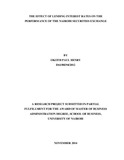| dc.description.abstract | The stock market fulfills a central function in the economy, bringing together savers and
investors (providers of capital) on the one hand with companies and the state (borrowers)
on the other. Without this mediator, the capital providers and borrowers would have to
negotiate directly, which would generate heavy search and information costs. Whereas
companies and the state often require large sums of long-term capital, most of the savers
and investors want to provide small amounts for relatively shorter time periods. The stock
market makes possible an optimal and efficient reconcilement of interests between these
groups. Savers and investors can buy and sell securities on the exchange at any time,
without directly affecting the companies. The relationship between interest rates and the
performance of the stock exchange has been the subject of research by scores of
researchers especially in the developed economies whereby the findings have been
contradicting. The objective of this study was to establish the relationship between
lending interest rates and the performance of stocks at the Nairobi securities exchange.
Secondary data was obtained from NSE and Central Bank of Kenya and analyzed using
regression on descriptive data with aid of SPSS. The data obtained from the Nairobi
securities exchange and the central bank of Kenya for the period January 2011 to
December 2013. The study found that lending interest rates are negatively related to NSE
performance. However, at 95% confidence level, the effect of lending interest rates on
NSE performance was not significant (p value of 0.56458). Further, the study found that
exchange rates are negatively related to NSE performance even though the relationship
was weak. Inflation was found to have strong, negative and significant effect on NSE
performance. The negative effect of inflation on NSE performance is stronger than that of
lending interest rates and exchange rates. The study recommended that the regulators to
formulate and implement policies to ensure that inflation rates, lending interest rates and
exchange rates remain low as possible so as to boost performance of NSE. | en_US |

